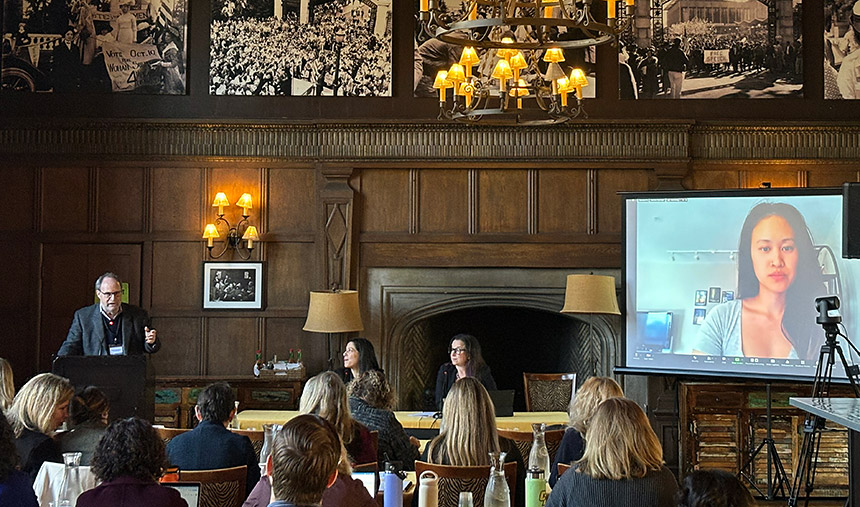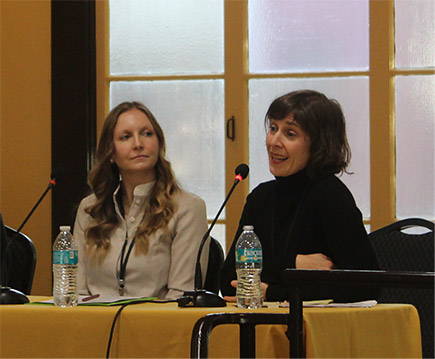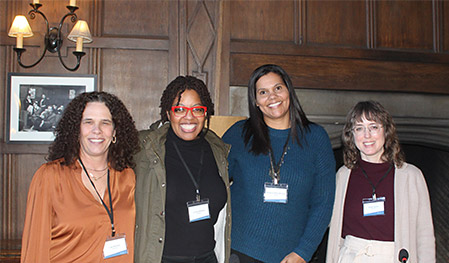
By Andrew Cohen
Several Berkeley Law alumni were among a group of leading experts who examined new developments and vexing challenges at a recent conference on gender discrimination, harassment, and violence.
Advocates, investigators, and academics provided updates from California and around the world at the event, presented by the school’s Berkeley Center on Comparative Equality and Anti-Discrimination Law. Panels explored prevention, litigation, non-litigation remedies, affirmative consent, defamation and backlash, investigations, Title IX and education, and growing attacks on diversity, equity, and inclusion (DEI) efforts.
“We need to do this work with empathy,” said Professor David Oppenheimer, the center’s director. “If we put ourselves in the shoes of those who have been abused, we will do this work effectively.”
With studies showing over 80% of women have faced sexual harassment or assault in their lifetime and 52% of employees experienced or witnessed workplace harassment over the past year, panelists emphasized that no one-size-fits-all cure exists for gender-related mistreatment.
Elena Acevedo ’07, a member of the Ethics & Investigations team at Intuit, the California-based global financial technology platform, stressed that foundational change requires companies viewing complaints through the lens of “what’s the right thing to do” for everyone involved rather than what’s the best way to protect the company.

A former Title IX officer at UC San Diego, Acevedo now helps craft prevention programs and dispute resolution techniques for Intuit.
“The approach should go hand in hand authentically with your values, with a tone that starts at the top and cascades down through a shared vocabulary,” she said. “We strive to make sure all employees have trust in our processes, and that those processes are transparent and show accountability. They’re detailed, consistent, and designed to focus on repairing relationships and restoring trust.”
Lily Harvey ’11, assistant director of outreach and education at the California Civil Rights Department, explained how state businesses with five or more employees are required to provide sexual harassment prevention training every two years — a two-hour program for supervisors, one hour for non-supervisors.
“Addressing the harm caused in a specific incident is very important, but achieving deep, systemic shifts is also important,” she said. “We have to try to get under the surface level to effect lasting change. Saying ‘We now have someone who does DEI’ doesn’t mean you’re done.”
Litigation strategies
Rudy, Exelrod, Zieff & Lowe partner David Lowe ’95 described how the exhilaration of the 1998 landmark verdict in Weeks v. Baker & McKenzie — in which a law firm secretary successfully sued her prominent employer for sexual harassment — did not lead to macro results he anticipated.
“The first six firms Rena Weeks approached declined the case because they thought it would be too difficult to go against such a huge firm,” Lowe said. “The type of harassment she experienced was frankly viewed at the time as relatively normal and what women in the workplace were expected to go through.
“The case was televised on Court TV. The jury awarded a $7 million verdict, the largest by far ever in a sexual harassment case … I thought, ‘Great: global media attention, big verdict, resounding message to employers. We can move on to the next challenge.’ But we continued to see additional sexual harassment cases affecting women up and down the levels of companies. We handled one case after another … yet even after the #MeToo movement, our phones kept ringing and women kept saying, ‘I’m experiencing sexual harassment in the workplace.’ ”

With individual cases failing to achieve systemic change, lawyers are now pursuing representative and class action strategies to exert more pressure on employers to treat gender-related issues more seriously. While class actions require satisfying myriad elements to be heard, Lowe and his co-counsel have begun using California’s Private Attorney General Act (PAGA) and the California Labor Code sections that mandate safe and healthy workplaces.
“You can file a case on behalf of the state to pursue justice for all aggrieved employees who suffered the same type of harm as the individual plaintiff,” Lowe explained. “We’re trying to publicize what tools are available to change the culture, to fundamentally renegotiate the relationship between employers and employees and give workers more power.”
Jennifer Reisch ’02, whose work has led to landmark pay equity legislation in California and who runs her own practice, called gender harassment a complex problem that appears at the individual, institutional, and even structural levels. While not dismissing the importance of litigation and policy reform, she said enduring change requires a shift in cultural norms.
“Many women who face sexual discrimination don’t seek redress, and the vast majority of harassment victims never report it even internally,” Reisch said. “There are many reasons: the need to keep one’s job for economic survival, a great fear and frankly likelihood of retaliation, concern about being re-victimized or re-traumatized going through the legal process, and difficulty getting evidence. The law still makes it quite challenging to seek collective, systemic solutions for these problems.”
Whereas Lowe and his co-counsel are pursuing a PAGA representative action against Tesla to combat sexual harassment, Reisch is collaborating with Bryan Schwartz ’00 and two other law firms on a class action to remedy pervasive and egregious racial harassment and racially hostile work environment against Black workers — both men and women — at Tesla’s Fremont plant. That case, brought in 2017 as a class action, led to a California Court of Appeal decision affirming the right to seek a public injunction under the state’s Fair Employment and Housing Act.
Panelists also noted the troubling rise in forced arbitration clauses many workers are required to sign, which led to federal legislation prohibiting it for instances of sexual violence or harassment.
“To achieve meaningful change, workers need to have a voice,” Reisch said. “With the decline of unionization, attacks on class actions, and the rise of forced arbitration, it’s increasingly difficult for workers to leverage any bargaining power.”
Backlash concerns
Jessica Ramey Stender ’09, policy director and deputy legal director at Equal Rights Advocates, tackled the issue of defamation suits and other forms of retaliation brought by those accused of sexual assault, sexual harassment, and other forms of harassment and discrimination — describing how this tactic picked up steam after the #MeToo movement.
“There’s a troubling increase in this type of backlash, especially retaliatory and baseless defamation claims against survivors saying their accusations caused harm,” she said. “These frivolous lawsuits, also known as Strategic Lawsuits Against Public Participation (SLAPP), are brought with intent to threaten, silence, intimidate, and dissuade survivors from speaking out.”
Employment lawyer Beth Mora lamented the impact of actor Johnny Depp’s multimillion-dollar defamation claim against his former girlfriend Amber Heard. She noted how coverage of and reaction to the suit fueled beliefs that the public should be skeptical of survivors and people who speak out against mistreatment, which has a chilling effect that keeps others from coming forward.
Panelists discussed how debunking myths and educating the public continue to pose challenges.
“Trauma survivors often may not act in a way the judges or juries would think they would,” Stender said. “Research shows that those who have experienced such trauma won’t necessarily remember or recount facts in a linear way because of the trauma and its effect on the brain. This can be weaponized against survivors in an attempt to discredit them in the context of these retaliatory defamation claims.”
Other Berkeley Law alumni experts shared their insights and expertise across different parts of the gender mistreatment landscape: Folger Levin partner Rosha Jones ’11 discussed the importance of confidentiality when people come forward, Oppenheimer Investigations Group senior attorney Ilona Turner ’06 outlined the fast-changing legal area regarding transgender rights, and Lieff Cabraser partner Jalle Dafa ’11 delivered part of the closing remarks about potential future strategies for advocates.
“The conference included speakers from Africa, Asia, and Europe, as well as the U.S.,”explained Oppenheimer, “because our center’s mission is to bring together scholars and advocates from around the world. Sex discrimination, harassment, and violence are global problems. When we examine how other countries and legal cultures address them, we generate new ideas about solutions.”